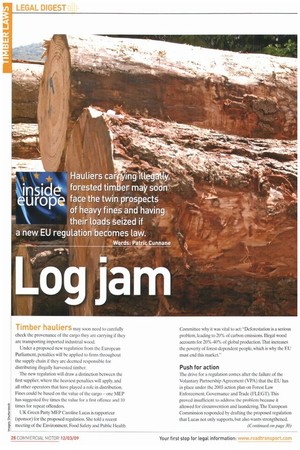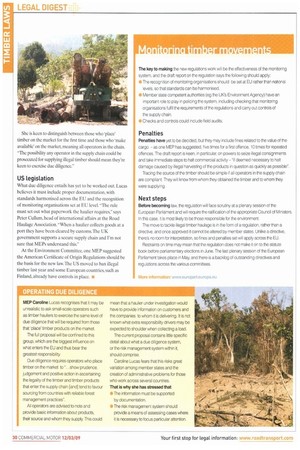Timber hauliers may soon need to carefully check the provenance,
Page 28

Page 30

If you've noticed an error in this article please click here to report it so we can fix it.
of the cargo they are carrying if they are transporting imported industrial wood.
Under a proposed new regulation from the European Parliament, penalties will be applied to firms throughout the supply chain if they are deemed responsible for distributing illegally harvested timber.
The new regulation will draw a distinction between the first supplier, where the heaviest penalties will apply, and all other operators that have played a role in distribution. Fines could be based on the value of the cargo — one MEP has suggested five times the value for a first offence and 10 times for repeat offenders.
UK Green Party MEP Caroline Lucas is rapporteur (sponsor) for the proposed regulation. She told a recent meeting of the Environment, Food Safety and Public Health Committee why it was vital to act: "Deforestation is a serious problem, leading to 20% of carbon emissions. Illegal wood accounts for 20%.-40% of global production. That increases the poverty of forest-dependent people, which is why the EU must end this market."
Push for action The drive for a regulation comes after the failure of the Voluntary Partnership Agreement (VPA) that the EU has in place under the 2003 action plan on Forest Law Enforcement, Governance and Trade (FLEGT). This proved insufficient to address the problem because it allowed for circumvention and laundering. The European Commission responded by drafting the proposed regulation that Lucas not only supports, but also wants strengthened. She is keen to distinguish between those who 'place' Limber on the market for the first time and those who 'make available' on the market, meaning all operators in the chain. "The possibility any operator in the supply chain could be prosecuted for supplying illegal timber should mean they're keen to exercise due diligence."
US Legislation
What due diligence entails has yet to be worked out. Lucas believes it must include proper documentation, with standards harmonised across the EU and the recognition of monitoring organisations set at EU level. "The rule must set out what paperwork the haulier requires,says Peter Cullum, head of international affairs at the Road Haulage Association. "When a haulier collects goods at a port they have been cleared by customs. The UK government supports a secure supply chain and I'm not sure that MEPs understand this."
At the Environment Committee, one MEP suggested the American Certificate of Origin Regulations should be the basis for the new law. The US moved to ban illegal timber last year and some European countries, such as Finland, already have controls in place. •




















































































































































